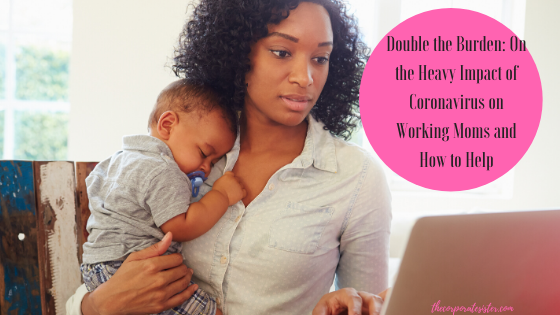As we navigate the Coronavirus crisis quarantined at home, many working moms are under extraordinary pressure to handle multiple priorities at once, including childcare, elderly care, remote work and household chores, in addition to keeping a level head and maintaining some sense of sanity. While many parents are working from home, the burden of care and household chores still traditionally remains on working moms, who also have to add to it the pressure (and obligation) of working remotely.
For many, if not most working mothers, it means rearranging their schedules to rise even earlier than usual to work, or staying up late to catch up on unfinished business. It also means homeschooling the at least 32.5 million students from kindergarten through 12thgrade, who may be reticent to studying at home, and having the patience to deal with the inevitable meltdowns and tantrums that may come with it. Add to it the piling up of dishes, laundry and household cleaning due to the majority of the family being home at the same time, and overwhelm, frustration and even resentment, may set in. This is without even considering the impact of the anxiety, worry and despair plaguing most of us as we painfully learn to live in a reality that is closer to science-fiction than anything we could have ever imagined…

What this also translates into for working mothers, are inescapable health-related mental costs, as the number of hours spent working inside the home on careers and businesses, in addition to childcare and household-related duties, increases, along with stress and anxiety levels. For working moms who do not have the benefit of salaried employment, are seasonal workers, or small business owners, the economic costs are outrageously high, as many, if not most, come to terms with not being able to put food in the table in a matter of days or weeks. Many working moms, single moms in particular, who relied on schools to provide meals to their children, or moms whose children need regular, expensive medication, are now facing dire economic circumstances.
As a working mom myself, I was shocked by the sheer amount of work, both childcare and household-related, in addition to adapting to working remotely in the midst of chaos and homeschooling, I now had to face. As my spouse had to go to work, this also meant dealing with the new situation alone at home. While I’m certainly counting my blessings, I also realized there are millions of working women faced with the same, if not worse, situation.
I can only imagine what the moms who work part-time performing essential duties that cannot be performed remotely, are going through. Women working part-time represent 2/3 of the population of part-time workers, as reported by the National Women’s Law Center, and are paid less in addition to having less access to benefits. Not to mention the working moms in the healthcare industry, or in other emergency fields like firefighters and public servants, who do not even have the privilege to stay home.
While this depicts a pretty dreary picture during this already depressing coronavirus crisis, it also reminds us of the importance of building plans and infrastructures that preserve working mothers in the regular course of business and life. The House passed a preliminary aid package including a provision to provide mothers and pregnant women out of a job with food.
While there should be contingency plans in place to protect everyone, working moms, most of whom in charge of caring for children and elderly, especially in the case of single moms and in many families represent financial, emotional and spiritual pillars, should not be forgotten.
Here are some ways to help working moms during the coronavirus crisis:
- Bosses, please be more understanding!
Working from home with kids is HARD. This is why it’s so important that working moms and their managers have honest conversations about work expectations during this time. This is largely uncharted territory, hence the importance of having flexible yet clear expectations, and being able to adapt to change.
- Use technology to help out
With the quarantine restrictions, it may mean children are expected to have more screen time than usual, with homework and activities being completed online. This also means that some working moms may have to get a computer, or not have enough computers for all their children. If you have a spare computer, consider helping out by sharing with less fortunate families.
Some companies have already started offering Internet streaming services for free, which will be a huge relief for families. Other ways to help include using technology to hold virtual play dates, or send tips and tricks to help working moms via text, email, or on social media.
- Parenting partners, please get on the same page!
In regular times, sharing responsibilities as parenting partners is challenging, with most of the childcare and household duties falling on working moms’ shoulders. If you’re a parenting partner to a working mom, it may mean considering adjusting your schedule to accommodate school closures, work disruptions, layoffs, and other disruptions bound to happen during this time.
It also may mean opening the lines of communication with your partner to understand what they’re going through, and how best to help, whether it’s operating in shifts, come up with creative alternatives, or just lending a compassionate ear.
- Just check in and ask how they’re doing
Sometimes, all someone needs is a smile and a word of encouragement. Many working moms are struggling to keep mentally healthy, in addition to their other preoccupations and worries. Just be kind!
- Offer assistance if you can
Can you spare a roll of toilet paper, some extra money, or just resources on funding (state or federal) and (trustworthy) information you can share? Your contribution can make the difference in someone’s day, so if you find yourself in a situation where you can help, consider doing so.
Overall, working moms are some of the hardest hit through the coronavirus case, economically, physically, and mentally. They also are the pillars of many, if not most families, who may not able to survive without them. As such, the burden to help and assist working mothers is on all of us, and the responsibility to help our common duty.
As a working mom, what challenges are you facing during the coronavirus crisis?
The Corporate Sis.







